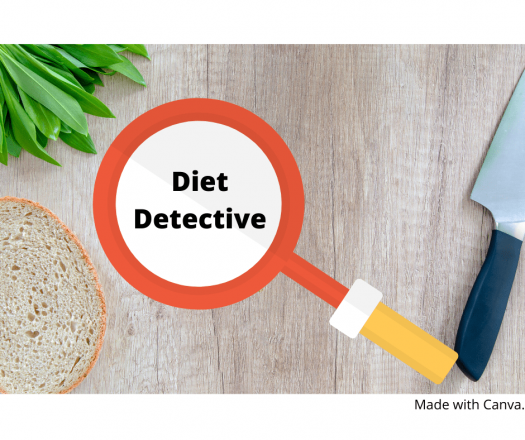By: Annabelle Shaffer, BS, Master’s candidate in the Division of Nutritional Sciences at University of Illinois Urbana-Champaign
With the new year, often comes diets promising quick and incredible results. The diet typically sounds simple: “Eat this one food and see awesome weight loss results!” or “Don’t eat this food group to lose weight!”. These diets are known as fad diets. Below, you’ll learn how to detect a fad diet and how to identify a healthful diet.
Warning Signs of a Fad Diet
- The diet requires cutting an entire food group. There are five food groups: dairy, fruits, vegetables, grains, and protein foods. Each group provides health benefits. Dairy products are rich in calcium. Fruits and vegetables are excellent sources of vitamin and minerals, and grains contain fiber. Protein foods, such as beans, eggs, and meats, help maintain muscle mass. While it can be healthful to limit the intake of certain foods, such as fried food, it is not necessary to eliminate an entire food group.
- The diet makes outlandish claims, such as “Lose 10 pounds of belly fat in 1 week!”. Healthful weight loss consists of losing 1-2 pounds weekly. If the diet results in quick and substantial weight loss, it poses a danger to your body by breaking down your skeletal and cardiac muscle. Unless your doctor has prescribed a rapid weight loss diet, such as before bariatric surgery, do not attempt a diet with these claims.
- The diet has unsustainable components, such as eating one specific food, like a meal shake or a particular juice. Diets that consist of one food, such as juice, shakes, or soup, may yield weight loss, but they are not sustainable. When we lose weight safely, we can lower our blood pressure and improve our insulin sensitivity, but if we regain that weight, we will lose those benefits. Always ask yourself: Can I sustain this for a lifetime?
- The diet lacks support from science or is only using information from a single study. Before you embark on a new diet, research it! Use library search tools or the U.S. National Library of Medicine (PubMed) to find studies using the diet. Look for peer-reviewed studies with a large number of participants and results repeated by other scientists. Registered Dietitians and physicians are also excellent resources.
We know what not to look for in a diet, but how can you find a safe, effective, and sustainable diet?
Look for eating plans with the characteristics below:
- Emphasizes a balanced diet with intake from all five food groups
- Follows the recommendations found in the Dietary Guidelines for Americans or from the medical community, such as the National Institutes of Health or Academy of Nutrition and Dietetics
- Promotes safe and sustainable weight loss techniques
References
- Fad Diets | Cleveland Clinic. (2020). Retrieved 1 February 2020, from https://my.clevelandclinic.org/health/articles/9476-fad-diets
- Key Recommendations. (2020). Retrieved 1 February 2020, from https://www.nhlbi.nih.gov/health/educational/lose_wt/recommen.htm
- Staying Away from Fad Diets. (2020). Retrieved 1 February 2020, from https://www.eatright.org/health/weight-loss/fad-diets/staying-away-from-fad-diets
Photo made with Canva.













